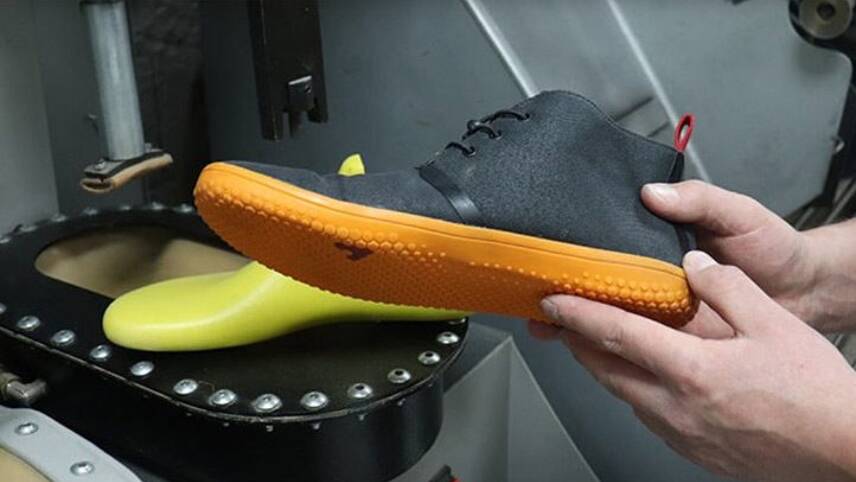Register for free and continue reading
Join our growing army of changemakers and get unlimited access to our premium content

The brand is hoping to create a closed-loop system for its products. Image: Vivobarefoot
Called Revivo, the platform launched earlier this week and is selling footwear which has been repaired by the craftspeople at The Boot Repair Company in Southend-on-Sea, as well as pairs of shoes which are ex-display or returned, at lower prices than new products.
The repair process sees all shoes receive steam cleaning and sanitation before they are sorted into one of three grades: like new, great condition or good condition, the latter of which means they require replacement soles. Graded shoes are then patched, have any broken eyelets or lace hooks replaced and get new soles as needed. As standard, the Boot Repair Company will re-stitch and over-lock all seams in order to ensure the repair lasts a long time. New packaging is then used to house the shoes.
Repaired shoes are listed online with clear visual communications indicating that they are not new.
At present, only shoes returned to the brand directly are up for sale. Vivobarefoot is developing a take-back scheme which will see shoes sent from customers to the Boot Repair Company and then onto its own facilities in London.
To incentivise uptake, Vivobarefoot provides those who send shoes with a proportion of the money fetched from their sale, in a manner similar to fashion consignment stores.
Vivobarefoot’s ultimate ambition is to ensure that none of its shoes go to landfill – a vision it is encouraging other, larger shoe and fashion brands to commit to.
Some 90% of shoes ever produced have ended up in landfill or incineration, according to the Ellen MacArthur Foundation, due to a lack of infrastructure and incentives around repair and recycling. Given that 25 billion pairs of shoes are produced globally each year, this means that as many pairs as 22.5 billion as being lost annually.
“No doubt, the elephant in the sustainable shoe room is end-of-life and the fact that nearly all shoes end up in landfill or, at best, get ground down into flooring material,” Vivobarefoot’s chief executive Galahad Clark said.
“The shoe industry makes shoes out of complicated different materials bonded together with a lot of petro-chemicals that will ultimately sit in landfill for a lot longer than the lives of the wearers.”
ReVivo builds on VivoBarefoot’s past work to improve the durability of its products and to incentivise a shift away from trend-led design in the footwear sector, which it claims will enhance the “emotional durability” of products – i.e. how long consumers enjoy and use their products for. In the future, the brand is hoping to pilot 3D-printed shoes incorporating recycled elements, and to increase its investment in chemical recycling processes for footwear.
Circularity on the catwalk
With public awareness of the fashion sector’s sizeable waste problem growing and many brands now planning for resource scarcity and more stringent legislation on materials and waste, many brands are turning to repair and resale.
Among them are Farfetch, Adidas, Burberry, Selfridges and Mulberry. This would appear to be a smart business move from an economic perspective as well as an environmental and ethical standpoint, given that the global fashion resale market is set to grow to $64bn by 2024, expanding 1.5 times quicker than the fast fashion sector.
There were initially fears that the Covid-19 crisis would stifle the efforts of businesses piloting fashion resale, due to customer concerns over hygiene and new restrictions on visiting stores to try on products. However, online resale platforms like Depop and ThredUP have recorded increased sales since lockdowns began to be mandated.
Fashion brands also appear to be upping their investment in recycling and recycled materials, from Adidas’ ocean plastic shoes; to Nike’s recycled ‘space hippie’ sneakers; to Burberry’s trench coats made from abandoned fishing nets; to Levi Strauss’ bags made from denim offcuts.
Earlier this month, Gucci became the latest big-name designer to pilot recycled designs, in the form of what it is describing as its first “fully sustainable” collection. The 37-piece ‘off the grid’ range is comprised of items made using only organic, bio-based, sustainably sourced or recycled materials. ECONYL, a recycled nylon made using discarded fishing nets and carpets, features heavily in the collection.
In recognition of the fact that solving fashion’s waste problems will likely require a reduction in consumption in the first instance, Gucci recently moved to overhaul its seasonal catwalks in favour of a “seasonless” model. Green campaigners and fashion thought-leaders have been urging other brands to follow suit.
Sarah George


Please login or Register to leave a comment.